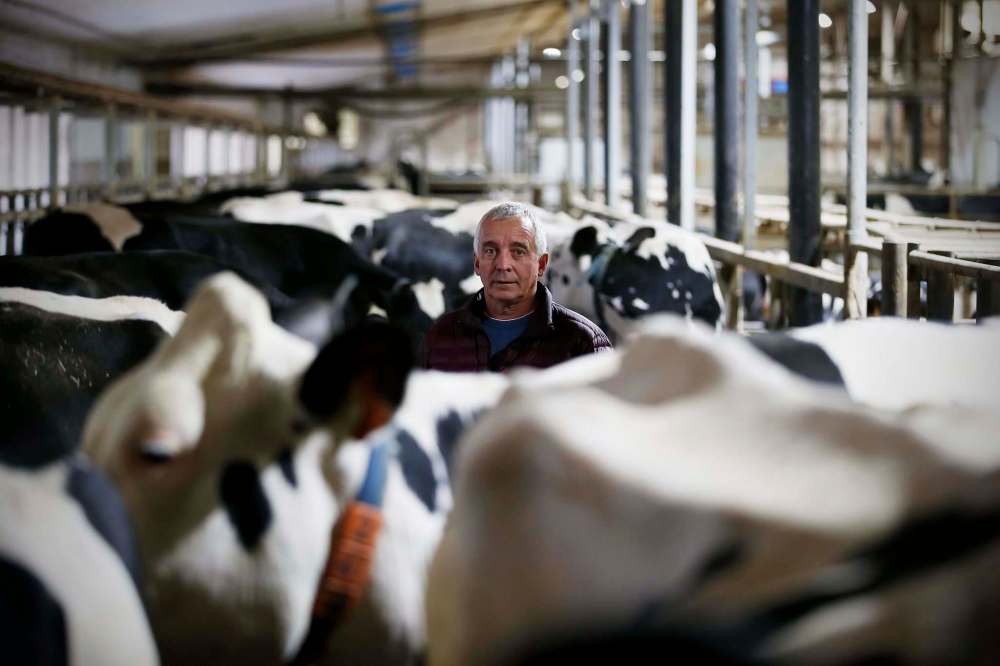U.S. too big, rich for Manitoba companies to not engage
Advertisement
Read this article for free:
or
Already have an account? Log in here »
To continue reading, please subscribe:
Monthly Digital Subscription
$0 for the first 4 weeks*
- Enjoy unlimited reading on winnipegfreepress.com
- Read the E-Edition, our digital replica newspaper
- Access News Break, our award-winning app
- Play interactive puzzles
*No charge for 4 weeks then price increases to the regular rate of $19.95 plus GST every four weeks. Offer available to new and qualified returning subscribers only. Cancel any time.
Monthly Digital Subscription
$4.99/week*
- Enjoy unlimited reading on winnipegfreepress.com
- Read the E-Edition, our digital replica newspaper
- Access News Break, our award-winning app
- Play interactive puzzles
*Billed as $19.95 plus GST every four weeks. Cancel any time.
To continue reading, please subscribe:
Add Free Press access to your Brandon Sun subscription for only an additional
$1 for the first 4 weeks*
*Your next subscription payment will increase by $1.00 and you will be charged $16.99 plus GST for four weeks. After four weeks, your payment will increase to $23.99 plus GST every four weeks.
Read unlimited articles for free today:
or
Already have an account? Log in here »
Hey there, time traveller!
This article was published 03/04/2025 (282 days ago), so information in it may no longer be current.
Whatever the outcome for Manitoba — and Canada — as a result of the seismic economic shift due to U.S. tariffs, there’s no denying the rise of a new global trade regime.
Stock markets around the world fell dramatically Thursday, and even if one thinks equity markets over-react, the consensus from Wall Street to Bay Street to Tokyo is punitive American tariffs are a bad thing.
Manitoba may have been initially spared, as it were — the provincial economy may be diversified but there’s only a minimal presence in the auto, aluminum and steel industries — but it has a way to go as a jurisdiction when it comes to negotiating the weird new U.S. market.

As Canadian businesspeople know well, that market is just too large and rich to ignore — and everyone is just going to have to deal with it.
Despite the fact Manitoba companies compliant with the Canada-United States-Mexico Agreement can ostensibly carry on without breaking stride, the new U.S. tariff regime will have deep implications at home.
One veteran Winnipeg-based trade consultant (speaking on condition his name not be used) said he recently spoke to a contact in Asia impacted by the USAID funding cuts and later noted potential scenarios for Manitoba companies.
For example: if workers at a plant in Bangladesh can no longer access medicine and can’t go to work, that plant can’t ship its products to the Manitoba company.
Of even more impact to the provincial economy, where $18 billion of goods representing 72 per cent of total exports are shipped to the U.S. annually, the trade consultant said he’s been getting more and more calls from mid-sized Manitoba companies looking for assistance in setting up operations in America.
He had previously worked almost exclusively with large companies who could afford his fees. “The impact on our economy is potentially quite significant.”
The motivation to seek support to set up some operation in the U.S. is clearly strong. It may be just a beachhead today, but before you know it, he added, they will start doing more in the U.S. and decide they do not need to continue to grow on this side of the border.
If, as Prime Minister Mark Carney says, the U.S. is no longer a reliable trade partner, it’s still going to be some kind of partner and Manitoba will have to figure out how best to engage.
Carlo Dade, a long-time trade expert with the Canada West Foundation who recently joined the School of Public Policy at the University of Calgary, believes Manitoba has a long way to go in that regard.
He said the province’s decision to hire a trade rep in Washington is too little, too late, and worries Manitoba does not have the kind of intel it needs to adequately stay on top of the shifting American landscape.
Reached at the annual North American Strategy for Competitiveness conference in Fort Worth, Texas, where a sizable Manitoba contingent was present, Dade said the vibe there was not panicked.
“One speaker was asked if the tariffs would change the landscape, and the guy said, ‘Chaos. Uncertainty. It must be Tuesday.’”
Dade said people should have seen these tariffs coming, after the first Trump administration (2017-21) saw how China was wielding its trade might against weaker nations and decided to do the same. “It’s like the cop that used to patrol the beat and protect us has turned into the cop that patrols the beat to shake us down,” he said.
A case in point was Trump’s reference during the Rose Garden spectacle Wednesday to Canada’s dairy industry trade barriers, claiming American exporters are faced with 200 per cent tariffs.
David Wiens, a Manitoba dairy farmer and president of Dairy Farmers of Canada (representing 9,700 farms in an industry that generated $17.4 billion in sales in 2022), said, not surprisingly, Trump got it wrong.
In 2024, Wiens said the U.S exported more than $800 million worth of dairy products into Canada tariff-free.
The renegotiated CUSMA in 2018 gave U.S. dairy exporters access to 3.9 per cent of the Canadian market before staged tariffs kick in. American suppliers have never accessed all the market capacity they could, Wiens said.
Regardless of what one might think of Canada’s supply management commodities, including eggs and poultry, as well as dairy, Wiens notes the food security and food sovereignty that system provides.
That’s one piece of comfort in the new world trading environment imposed by the new international bully who is Canada’s closest, oldest and most important trading partner.
It says a lot that by not losing more, Canada was a winner Wednesday.
martin.cash@freepress.mb.ca
History
Updated on Friday, April 4, 2025 9:29 AM CDT: Corrects photo cutline









